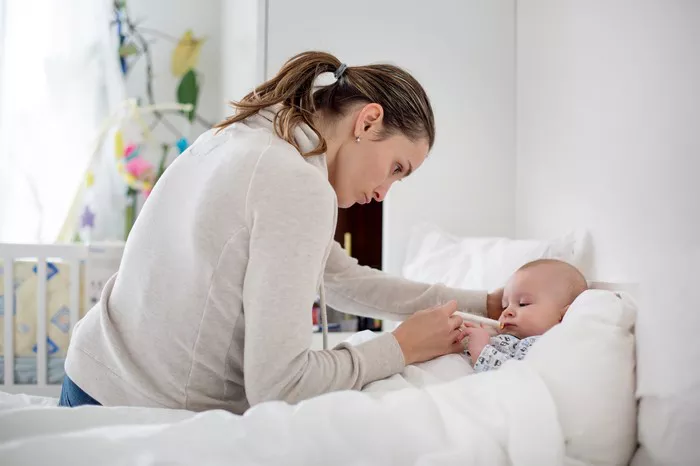Seasonal allergies can affect even the youngest members of the family. While we often associate sneezing and watery eyes with older children or adults, babies can also show signs of allergic reactions to pollen, mold, and other environmental triggers. As a parent or caregiver, it’s essential to recognize the symptoms and know how to ease your baby’s discomfort. This guide outlines practical steps to help your baby during allergy season.
Understanding Seasonal Allergies in Babies
What Are Seasonal Allergies?
Seasonal allergies, also called hay fever or allergic rhinitis, occur when the immune system overreacts to airborne substances such as pollen or mold spores. These allergens are more common during specific seasons, especially spring and fall.
Can Babies Have Seasonal Allergies?
Yes, although true seasonal allergies are uncommon in babies under 1 year old, some infants may still show sensitivity to environmental allergens, especially if there’s a family history of allergies, asthma, or eczema.
Common Allergens That Affect Babies
- Tree pollen (spring)
- Grass pollen (late spring to summer)
- Weed pollen (late summer to fall)
- Mold spores (damp, warm environments)
Recognizing the Symptoms
Typical Signs of Seasonal Allergies in Babies
Seasonal allergies in babies can mimic cold symptoms, but there are a few differences to watch for:
- Persistent runny nose (clear mucus)
- Frequent sneezing
- Itchy or watery eyes
- Nasal congestion or sniffling
- Coughing, especially at night
- Mild skin rashes or eczema flare-ups
- Fussiness or trouble sleeping due to nasal discomfort
How to Tell Allergies from a Cold
| Symptom | Allergies | Cold |
|---|---|---|
| Duration | Weeks or entire season | 7–10 days |
| Fever | Rare | Common |
| Mucus color | Clear | Often yellow or green |
| Itchy eyes/nose | Common | Rare |
| Sneezing | Frequent | Less frequent |
If you’re unsure, always check with a pediatrician for an accurate diagnosis.
How to Help Your Baby Feel Better
Limit Exposure to Allergens
The best way to manage seasonal allergies is to reduce your baby’s exposure to triggers.
Keep Windows Closed
Keep windows shut during high pollen seasons to prevent allergens from entering your home, especially during the early morning and late afternoon when pollen counts peak.
Use Air Purifiers
Invest in a HEPA air purifier for your baby’s bedroom. These devices can filter out pollen, dust, and mold particles from indoor air.
Change Clothes After Outdoor Time
If your baby has been outside, change their clothing and wipe down their hands and face to remove pollen.
Bathe Your Baby Daily
Bathing your baby in the evening helps wash off pollen and prevents it from transferring to their bedding.
Maintain a Clean Indoor Environment
- Vacuum regularly using a vacuum with a HEPA filter.
- Dust furniture with a damp cloth to trap allergens.
- Avoid using fans that draw outdoor air inside.
- Keep pets groomed and out of the baby’s sleeping area, as they can carry pollen indoors.
Breastfeeding and Allergies
Some studies suggest that exclusive breastfeeding for the first 4–6 months may help protect against allergies later in life. Breast milk contains antibodies that support a developing immune system.
If your baby is formula-fed and showing allergic symptoms, consult your pediatrician to see if a hypoallergenic formula is appropriate.
Moisturize Baby’s Skin
If your baby has eczema or dry patches, seasonal allergens may worsen skin irritation. Use a gentle, fragrance-free baby moisturizer after baths to keep skin hydrated.
Medical Treatment Options
Consult a Pediatrician First
Before giving your baby any medication, speak with your doctor. Your pediatrician may recommend or prescribe allergy relief based on your baby’s age and symptoms.
Common Treatments (for Older Infants)
For babies over 6 months, doctors might suggest:
Antihistamines (e.g., cetirizine or loratadine): Can relieve sneezing and runny nose.
Saline nasal drops: Help clear nasal congestion naturally.
Nasal aspirators: Useful for removing mucus and easing breathing.
Hydrocortisone cream: For eczema flare-ups (prescription or doctor-approved over-the-counter).
Medications to Avoid
Do not give babies:
- Over-the-counter decongestants
- Medications not recommended by your pediatrician
- Products containing pseudoephedrine or phenylephrine
Always read labels and check with your doctor before use.
When to Seek Medical Help
Call your doctor if:
- Your baby’s symptoms last longer than two weeks.
- Breathing becomes difficult or wheezy.
- Feeding is affected due to nasal blockage.
- There is a persistent cough or signs of ear infection.
- Rashes worsen or look infected.
Early medical advice can prevent complications and ensure your baby gets the best care.
Preventing Future Allergy Issues
Monitor for Other Allergic Conditions
Babies with seasonal allergies may be more likely to develop:
- Asthma
- Food allergies
- Eczema
Keep track of your baby’s reactions and report changes to your doctor.
Allergy Testing (If Recommended)
Most doctors won’t recommend allergy testing for infants under 12 months unless symptoms are severe. However, for persistent issues, your pediatrician may refer you to an allergist for:
- Skin prick tests
- Blood tests to check for IgE antibodies
Track Pollen Levels
Use weather apps or websites to check daily pollen counts in your area. Limit outdoor exposure on high-pollen days.
Conclusion
Helping your baby cope with seasonal allergies involves understanding the symptoms, reducing allergen exposure, and following medical advice. While managing allergies can be challenging, many babies find relief through a combination of environmental changes and safe, doctor-approved treatments.
You Might Be Interested In:
- Breakthrough in Understanding Fever’s Role in Immune Response
- Breakthrough in Understanding Autoimmune Rashes: New Research Reveals Key Triggers
- Rising Cases of Carrot Allergy Linked to Pollen Cross-Reactivity

